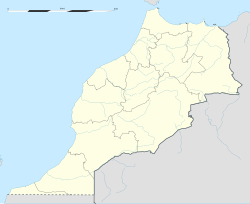Azrou
Azrou
Aẓro ⴰⵥⵔⵓ أزرو | |
|---|---|
Azrou, Morocco | |
| Coordinates: 33°26′30″N 5°13′29″W / 33.44167°N 5.22472°W | |
| Country | |
| Region | Fès-Meknès |
| Province | Ifrane |
| Population (2014)[1] | |
• Total | 81,350 |
| Time zone | UTC+0 (WET) |
| • Summer (DST) | UTC+1 (WEST) |
Azrou (Berber: Aẓro, ⴰⵥⵔⵓ, Arabic: أزرو) is a Moroccan town 89 kilometres south of Fez in Ifrane Province of the Fès-Meknès region.
Geography

The market town of Azrou is located at a strategic crossroads of the N13 and N8 roads towards the northern end of the Middle Atlas. The N13 road connects Azrou to Meknes in the north west and Midelt in the south east. The National Route N8 comes from Fes in the north east and continues to Khenifra and then Marrakech in the south west.
Azrou is at an altitude of 1250 m and surrounded by mountains covered with evergreen holm oak and cedar.[2]
The Cèdre Gouraud Forest is located to the south east, where one of the sub-populations of the Barbary macaque, Macaca sylvanus (called magots) is found.[3] In addition to its rich biodiversity symbolized by the famous cedar forest there are the butterflies which are unique in the world. The surroundings of Azrou are a centre of attraction for the residents, hikers, and picnickers of the large neighbouring towns. These surroundings are also home to the 'Cedre Gouraud' or 'Grand Cedar', a famous tourist attraction. This place is also famous due to the macaque apes that live in the area and are drawn by tourist activity. Moreover, the Azrou forest provides an excellent hiking and exercising environment and also holds several summer camps for children. Azrou urban construction is in the European style (red tile roofs).
The region is also known for its cherry trees, apple trees, fish farms, and the abandoned sanatorium in the surrounding metropolitan area of Ben Smim.
Toponymy
Azrou is a geomorphological name taken from the landform of a large rock outcrop (Aẓro, ⴰⵥⵔⵓ, means "rock" or "stone" in the Berber language Tamazight) in the centre of the city.[2]
History

Azrou is mostly known for hosting the first high school in the Berber region: the Berber high school of Azrou (now the Tarik Ibn Ziad school). It was built by the French colonial authorities in order to train Moroccans for the colonial administration.[4] It was one of the instruments for the implementation of a Berber Dahir by which the King of Morocco left the Berbers to regulate their justice according to their customs without resorting to other jurisdictions (Colonial or "makhzen"). The college became an educational institution in the reference area, forming part of the political and military elites from 1956 to 1973, after independence, the college was renamed Azrou Tarik Ibn Ziad High School.
The town was long neglected by the Moroccan authorities since independence in 1956 to the detriment of the nearby town of Ifrane. Although it is the true capital of the Middle Atlas and a town that has given Morocco many leaders and intellectuals, the town still does not officially rank as provincial capital, although it is in practice.
The town has several hotels.
Picture Gallery
-
The Rock of Azrou
-
Azrou city
-
A macaque in the forest of Azrou
-
The Place Muhammed V
-
Sheep Market
-
An Azrou street
-
The Azrou rock
-
Azrou town
Twinning
The city has signed a protocol of cooperation with Blois in July 2011[5]
Sources
- ^ "POPULATION LÉGALE DES RÉGIONS, PROVINCES, PRÉFECTURES, MUNICIPALITÉS, ARRONDISSEMENTS ET COMMUNES DU ROYAUME D'APRÈS LES RÉSULTATS DU RGPH 2014" (in Arabic and French). High Commission for Planning, Morocco. 8 April 2015. Retrieved 29 September 2017.
- ^ a b Tourist article Template:Fr icon
- ^ C. Michael Hogan, (2008) Barbary Macaque: Macaca sylvanus, Globaltwitcher.com, ed. Nicklas Stromberg Archived 2012-04-19 at the Wayback Machine
- ^ The College of Azrou, for berber civil and military élite in Morocco, 1927-1959, Mohamed Benhlal Template:Fr icon
- ^ Twinnings of the town of Blois Template:Fr icon















